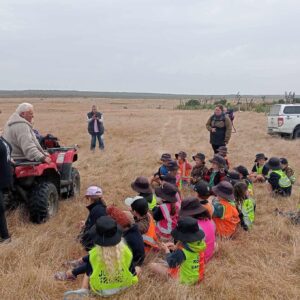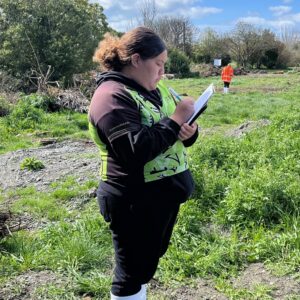Who is in your bubble?
We have got Max and Millie, my one and three year olds, my wife Aleisha, and we’ve got an au pair that lives with us as well, from America. She snuck into the country about 12 hours before the lockdown. And so she spent about two weeks with us in isolation in a sleepout out the back. But now she’s up and running, so we’re quite lucky that we’ve got childcare support at home.
Was that a coincidence, or did you quickly ship her out here before lockdown?
It was all a happy coincidence. But we got the sense as we started moving through the lockdown levels that eventually they were going to get to the point where we were moving into that Level 4 stage. And they had then announced that the borders were going to close at midnight, and she got in the morning prior. So it all ended up working out perfectly. But we were quite nervous in the lead-up to that around whether or not everything was going to work, and how we were going to manage without childcare.
So how did you manage childcare for those first couple of weeks?
Honestly, Aleisha and I sat down with our calendars – she is a city councillor here in Palmerston North – and we worked out who had priority for certain parts of the day. Aleisha was quite lucky because a lot of her council stuff had slowed down, so she was able to take the lead in that. But at the same time, from NZEI’s perspective we were ramping up – there was an awful lot of work to do around making sure members were protected and supported as we were moving into lockdown.
There was an awful lot of work to do around making sure members were protected and supported as we were moving into lockdown.
Everything worked out, but it was a busy couple of weeks tying everything together. It filled me with appreciation when I look at what we were dealing with then and what a lot of our members are dealing with now, because they’ve still got their own childcare arrangements that they’re having to do and I know not everybody gets that luxury of in-house support.

Our members are doing amazingly well, aren’t they?
Yeah, and I hear people with teenage kids not getting up until 11 o’clock, and that’s just not my reality right now! So for people with young children, you don’t have the luxury of saying, “Look, I’ve got this on between two and three, can you do this?” You’re kind of on-demand. And so I’ve got a lot of appreciation for those who are doing it with minimal support.
How have you been taking care of your own health and wellbeing?
My role was going from one where I’d talk to the kids on video conference two or three times a day and then talk to Aleisha at night, to one where I’m actually spending the mornings and evenings with the kids and Aleisha. So being able to get all that extra face-to-face time with my family has probably been the silver lining to all this.
There’s been massive parts of being at home that I’ve really enjoyed, particularly when I think of the cool things that Max and Millie have been doing that I’ve been able to witness. I think that’s probably the biggest thing.
But apart from that, I’ve been running a lot more than I normally would.
Are you finding you’re getting to know your own children a bit better?
Yeah, just that whole concept of relationships I think in a lot of ways has been strengthened. That’s certainly what I’m hearing from teachers and support staff that are engaging with their students – they actually have a familiarity with their parents that they don’t usually get, and that conversation’s not grounded in what’s going on for literacy and for numeracy; it’s a holistic conversation around how’s their child getting on. I think that’s one of the benefits.
I’m hearing from teachers and support staff that are engaging with their students – they actually have a familiarity with their parents that they don’t usually get.
The other is you’re actually going out there searching for ways to be socially connected with people. The amount of virtual drinks I’m having in the evening with people, as a chance to see what life’s like for them!

You’ve long been a fan of the potentials of technology. Have you learnt anything new in these past few weeks about what technology can do?
I think it has really shown the important role that educators play in this country. I was even talking to my mum before – she’s got a five-year-old at home – and she’s talked about how being in lockdown has strengthened her understanding that she could never be a teacher. And how important it is for how teachers are using technology to engage with their students.
I was even talking to my mum before – she’s got a five-year-old at home – and she’s talked about how being in lockdown has strengthened her understanding that she could never be a teacher.
In terms of how I’m working, I’ve been really impressed with how much stuff can take place through technology. For the longest time, I was always sceptical around whether or not video conferencing was a useful tool for conversation and decision-making, but now that we’ve been forced into that I can see that we’re going to be holding on to some of those practices moving forward.
I think, though, in terms of a learning perspective, I’m still yet to be convinced that online resources are delivering better learning outcomes for students. I think we’re seeing the benefits in the connection and relationships that it is helping to facilitate, but in terms of the learning opportunities online – I think, at best, they will only ever be able to supplement what good teaching and learning does.
I think we’re seeing the benefits in the connection and relationships that it is helping to facilitate, but in terms of the learning opportunities online – I think, at best, they will only ever be able to supplement what good teaching and learning does.
How do you see schools and centres being able to support their communities in the medium-term, when there are so many job losses and changes?
I think front and centre, it’s going to shift the conversation to be wholly about wellbeing. That’s going to be about the wellbeing of educators, the wellbeing of students and the wellbeing of whānau.
I think we have to be really careful in moving into the trap of thinking that schools and early childhood centres, within their own resourcing and capability, are going to be able to do that effectively. There’s going to be a massive job for the Ministry of Education and the government to make sure that they’re coming to the party around how we as a country effectively recover from Covid. I’m really looking forward to being a part of those conversations, because the idea that this is all going to fall on schools and early childhood centres within themselves to be able to do, I think is going to lead to some real longterm damage.
But the actual on-the-ground stuff is going to be done by schools and early childhood centres because they have the needs of their communities at their heart. I think that’s a real strength of the system that we’ve got. So I see it as a two-way street, where there’s definitely going to need to be some system-level support, but at the same time, I think schools and early childhood centres are up to the task of being central in what this recovery is going to look like.
There’s definitely going to need to be some system-level support, but at the same time, I think schools and early childhood centres are up to the task of being central in what this recovery is going to look like.

The lighting round… What’s your dress code for working from home?
So, the first couple of days, I was fully about T-shirts, but then I realised that Paul Goulter was giving me some disapproving glances from the other side of the Team hui. So since then, I have been wearing shirts. It’s quite nice because when you take off your shirt at the end of the day, it’s like a thing that you’re doing to show that the work day is over. It never actually works out that way, but still it’s a visual thing you can do. But apart from that, I’m in shorts and bare feet underneath, so I’m enjoying that part.
And what’s for dinner?
I have no idea! But we have been lucky that we’ve done a week’s worth of Hello Fresh meals so it’ll be something there, and they always seem to hit the mark.
What’s your tip for working from home?
Effective communication with the other people in the house. Aleisha is off doing her stuff as well. We realised really quickly you couldn’t do two video conferences in the same room, so at the beginning of the week we do this thing called Fin-Chat, where we look at the week’s finances and organisation and one of the topics there is to look at each other’s calendars to work out who gets priority of the office. Aleisha’s in the middle of annual planning this week so she’s got the office, which is why I’m in the bedroom.




